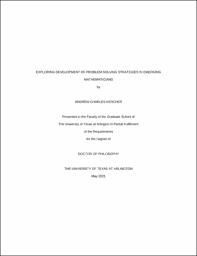
ATTENTION: The works hosted here are being migrated to a new repository that will consolidate resources, improve discoverability, and better show UTA's research impact on the global community. We will update authors as the migration progresses. Please see MavMatrix for more information.
Show simple item record
| dc.contributor.advisor | Alvarez, James A.M. | |
| dc.creator | Kercher, Andrew Charles | |
| dc.date.accessioned | 2021-06-01T18:11:47Z | |
| dc.date.available | 2021-06-01T18:11:47Z | |
| dc.date.created | 2021-05 | |
| dc.date.issued | 2021-04-29 | |
| dc.date.submitted | May 2021 | |
| dc.identifier.uri | http://hdl.handle.net/10106/29796 | |
| dc.description.abstract | To solve an unfamiliar mathematics problem, students of the subject must know more than the appropriate prerequisite content knowledge. They must also know how best to strategically apply their knowledge, how to monitor and gauge the effectiveness of their work, and how to respond (both cognitively and emotionally) to unanticipated results. Expanding current research on the types of experiences that foster these skills is the objective of this study.
In a sequence of two task-based interviews, eight graduate and four upper-division undergraduate mathematics students solved non-traditional mathematics problems, used their work on these problems as a basis to comment on their mathematical beliefs and problem solving strategies, and tied these aspects of their mathematical identity to the formative courses, instructors, and experiences that influenced them. I then analyzed these interviews using coding techniques appropriate for thematic analysis and created qualitative characterizations of the participants’ problem solving strategy usage. By comparing these characterizations to the ways in which the participants reported that their problem solving had developed over time, I identified which types of formative experiences may have contributed to this development (and how they did so).
Findings suggest when participants had been encouraged to discover their own mathematical justifications in previous courses, they would be likely to display creative, exploratory behavior while solving interview tasks, even when frustrated. Participants who valued experiences in which they participated in meaningful mathematics as part of a group were more comfortable engaging in self-talk and considering multiple approaches to an interview task. Finally, many participants reported learning specific heuristic strategies, either explicitly from instructors or as a consequences of the nature of a course; findings indicate that the degree to which they could effectively leverage any of these heuristics depended on if they were comfortable and familiar with their application. These results point mathematics instructors towards ways that they can develop problem solving expertise in their students. | |
| dc.format.mimetype | application/pdf | |
| dc.language.iso | en_US | |
| dc.subject | Problem solving | |
| dc.subject | Graduate students | |
| dc.title | EXPLORING DEVELOPMENT OF PROBLEM SOLVING STRATEGIES IN EMERGING MATHEMATICIANS | |
| dc.type | Thesis | |
| dc.degree.department | Mathematics | |
| dc.degree.name | Doctor of Philosophy in Mathematics | |
| dc.date.updated | 2021-06-01T18:11:48Z | |
| thesis.degree.department | Mathematics | |
| thesis.degree.grantor | The University of Texas at Arlington | |
| thesis.degree.level | Doctoral | |
| thesis.degree.name | Doctor of Philosophy in Mathematics | |
| dc.type.material | text | |
| dc.creator.orcid | 0000-0003-1387-7242 | |
Files in this item
- Name:
- KERCHER-DISSERTATION-2021.pdf
- Size:
- 2.127Mb
- Format:
- PDF
This item appears in the following Collection(s)
Show simple item record


